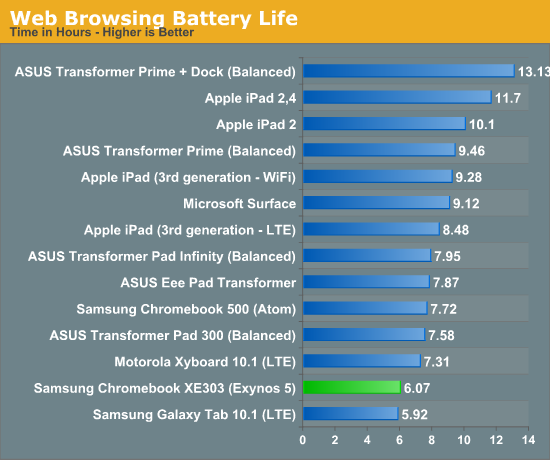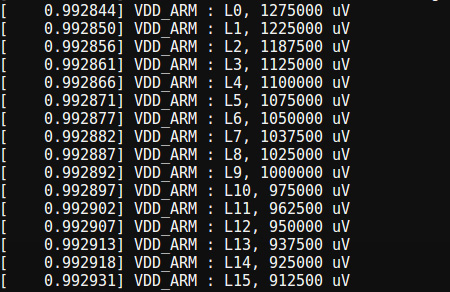Samsung Chromebook (XE303) Review: Testing ARM's Cortex A15
by Anand Lal Shimpi on October 31, 2012 9:00 AM ESTBattery Life & Power Analysis
The final unknown in all of this is power consumption. ARM's Cortex A15 isn't really supposed to be a sipper of power, and when placed in a notebook I don't know that there's a lot we can conclude about how it stacks up to Atom either. Some high level power consumption data would normally help but these two platforms are fairly different:
| Samsung Chromebook Power Consumption Comparison | ||||||
| Display @ 200 nits | Idle | Kraken (Avg) | Kraken (Peak) | |||
| Samsung Chromebook 500 (Atom N570) | 11.53W | 14.4W | 15.2W | |||
| Samsung Chromebook 303 (Exynos 5 Dual) | 6.33W | 10.5W | 11.3W | |||
The new Chromebook consumes considerably less power at idle than its predecessor. The smaller display, simplified motherboard and truly integrated SoC platform are likely all to thank for this. The significant reduction in power also helps explain the big reduction in battery capacity as well.
Under load, the two platforms do see differing levels of additional power consumption. The new Exynos 5 based Chromebook sees a dramatic increase in power consumption under load, hitting 10.5W (a 66% increase over idle) while running Mozilla's Kraken benchmark. The Atom N570 based Chromebook increases power consumption as well, but just not by as significant a degree: ~25%. This actually helps illustrate exactly why Atom wasn't phone worthy in its earlier incarnations. Contrary to popular belief, it wasn't actually peak power consumption that was the problem (a move to 32nm can easily eat into these numbers). The total platform power consumption, particularly at idle, was Atom's real problem in the early days. It also turns out that this is much of what keeps Intel's Core processors from moving into ultra mobile form factors, something that Haswell is supposed to address.
Given that we're dealing with somewhat different panels here, I wanted to see what power consumption looked like if we removed the panels from the equations. I re-ran all of the power data with the display turned off:
| Samsung Chromebook Power Consumption Comparison | ||||||
| Display Off | Idle | Kraken (Avg) | Kraken (Peak) | |||
| Samsung Chromebook 500 (Atom N570) | 8.82W | 11.4W | 12.4W | |||
| Samsung Chromebook 303 (Exynos 5 Dual) | 4.07W | 8.32W | 9.27W | |||
The old Atom based Chromebook uses more than twice the idle power of the new version - it's no wonder Google was able to get away with a battery half the size. Once again however we see a much larger increase in power consumption once the Cortex A15 is under heavy load. Active power consumption more than doubles on the new Chromebook, while we see around a 30% increase on the Atom based system. I do wonder what will have to be done to get the Exynos 5 Dual into a smartphone as an increase of ~4W under load just won't cut it in a phone. The Atom platform shows a 2.6W increase in power under load, which sounds about right for a high clocked 45nm part.

Despite the more power efficient platform, the reduction in battery capacity puts the new Chromebook well below the Atom model in battery life. Our wireless web browsing test put the new Chromebook at just over 6 hours of continuous use on a single charge. For a notebook that's not too bad, but compared to modern tablets it's not good.

The performance gains over Atom (and by extension, the ARM Cortex A9) do give us some indication as to what could be done to get Exynos 5 into a smartphone. By dropping clocks much lower than 1.7GHz Samsung would be able to maintain a performance advantage in a very power constrained device and hopefully keep power in check. The photo above features a list of all of the voltage levels supported by Samsung's Exynos 5 Dual as implemented in the new Chromebook.










149 Comments
View All Comments
zappb - Wednesday, October 31, 2012 - link
looks awesome - between this and the Nexus 10Flunk - Wednesday, October 31, 2012 - link
I recommend the Nexus 10, better screen and OS. ChromeOS is a real turkey.quiksilvr - Wednesday, October 31, 2012 - link
It really boils down to what you need. If you can live without a keyboard, get the Nexus 10. If you are on a budget, get this. If you want a keyboard and are willing to shell extra dough, get the Nexus 10 and a bluetooth keyboard.B3an - Wednesday, October 31, 2012 - link
He wasn't talking about keyboards and form factors. Chrome OS is almost completely useless for anything more than browsing the net. It's about equivalent to a basic feature phone in capability. It's for such a small niche, about the only people i could see buying Chrome OS notebooks are extremely poor students, and even then it probably wont do everything they want.jeffkro - Wednesday, October 31, 2012 - link
Another niche market is for people that do online investing and banking with significant assets. The added security of chrome OS is well worth having for $250 you won't find much cheaper insurance. Windows is just not safe for online financial transactions, which of course the poor student doesn't have to worry about.jeffkro - Wednesday, October 31, 2012 - link
By the way I find google docs to be pretty useful for productivity. I used to use open office and since I made the switch I haven't looked back. Netflix not being supported on the ARM version is kind of a bummer though. I think Google should make sure that Hulu, Netflix, and Amazon streaming all work as this definitely fits under the umbrella of cloud computing.damianrobertjones - Thursday, November 1, 2012 - link
Windows is safe... Don't run as full admin and maybe the user might have some common sense not to visit porn sitesklmccaughey - Thursday, November 1, 2012 - link
No, they can use a Chromebook to visit porn sites or any other activity (long list) that might get them on trouble in Windows.I maintain the computers (just) in my house and home office, and for one user I really wish he had a Chromebook and not a Windows laptop - I keep having to restore it from image.
Oh and I use Windows 7 x64 as my main machine, with Ubuntu VM for development.
Wolfpup - Friday, November 2, 2012 - link
Nothing wrong with porn sites...like any other business they're not especially wanting to screw over their customers.Sabresiberian - Friday, November 2, 2012 - link
ChromeOS is NOT more secure than Windows. You are putting too much stock in anti-Microsoft blather from Google. Might as well listen to Apple's opinion of Windows.Does this SoC even have the hardware security features built into Intel and AMD x86 chips (AES, Intel Secure Key, OS Guard)? I don't think it does. ChromeOS might require different methods to crack, but it is not more secure, and the hardware of the Chromebook is less secure.
Besides, I'd imagine any successful investor is going to be using something a lot more satisfying than a tiny, cheap netbook variation with a so-so screen.